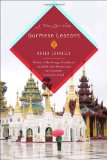Summary | Excerpt | Reviews | Beyond the Book | Readalikes | Genres & Themes | Author Bio

A True Love Story
by Karen Connelly
Here is Chinatown, with its blue and green buildings, wooden shutters and elegant roofs, looking romantic in the gold leaf of dusk. The paint on the buildings is new, thin and lime-based, making the whitewashing both literal and figurative. The SLORC—that is, the State Law and Order Restoration Council, the group of generals who rule Burma—recently decreed it for all the buildings of Rangoon. Not so long ago, the SLORC also forcibly moved entire communities of the city's poorest people into primitive shantytowns on the periphery of the city so that foreign visitors like myself are not burdened with the sight of them.
The city is being beautified because, after decades of a socialist isolationist policy—the Burma Socialist Program Party was created by General Ne Win, who staged a coup d'état in 1962—the regime has changed its stripes. This is Visit Myanmar Year, and the government wants foreigners to visit, spend money, come back, and, most important, do business. The usual weeklong visa has been extended to a month; business visas last longer. There are Lucky Strike and Chivas Regal billboards on the streets; a few big hotels are already standing and more are under construction, most of them built jointly by the SLORC and its favorite business partners, the Chinese. The shift to a free-market economy came abruptly, in 1989, after decades of mismanaged and increasingly non-functioning nationalization schemes. The aged General Ne Win handed power over to a group of generals under his sway—the SLORC—and within months "the Burmese way to socialism," as it used to be called, became the Burmese way to rampant capitalism fueled by the opium trade and the plunder of natural resources. The beneficiaries of this extraordinary economic shift are the generals—all of whom are ethnic Burmans and Buddhists—and their business partners and friends, who are often Sino-Burmese with connections to the Chinese business world and black market. There are Thai, Singaporean, German, French, American, and Canadian companies in Burma as well, operating factories, mines, pipelines in direct association with the generals, but their presence is minuscule compared with that of the Chinese. In less than a decade, most of Mandalay's shops, hotels, restaurants, and prime real estate have been sold to Sino-Burmese and Chinese people, who are able to buy the identity papers of dead Burmans for a few hundred dollars. The same shift of ownership is happening in Rangoon as impoverished Burmese people are forced to sell their properties. When I left the guesthouse, I asked Myo Thant, the clerk, the best way to get to Chinatown. He laughed and said, "You're in Chinatown already." I shook my head, misunderstanding. "The whole city," he said. "It is becoming Chinese town."
But I'm in the heart of old Chinatown now. And I am lost. Darkness falls quickly, as it does in the tropics, and falls hard, as it does in Rangoon, because none of the lights on these streets are working. I take a moment to get my bearings and consult my map, which happens to have several errors on it—that is, if I'm reading it correctly. Soon I am rushing around in the dark, flustered and big-eyed and without composure, approaching and retreating from the wrong pools of light and people, my glasses slipping down my nose.
But I do find my dinner party, finally, when San Aung sees a woman stumbling by on the broken pavement and calls out, "Miss Karen," accent on the second syllable, Ka-rén, like the ethnic group that has been at war with the Burmese military for half a century. I approach the table, smiling and sweating in equal measure as I greet everyone, a dozen or so dinner guests gathered together by San Aung, who is not in his fifties at all but is a good-looking man of perhaps thirty-five with high cheekbones in a long Indian face. With his gorgeous head of gleaming hair and his immaculate clothes, he looks like a movie star. He wears a blue pin-striped shirt and a dark blue longyi; both seem to have been lifted off an ironing board five minutes ago. He shakes my hand three times, then lets go and turns to introduce me to the others, giving me condensed biographies as we make our way around the table of mostly Burmese writers. But a lawyer is also here, and a history professor who works at the Japanese embassy (the pay is much better, the university is a shambles), a burly ship's captain who loves Gorky (he announces this immediately, as an intellectual credential) a woman who collects Burmese folktales, and a Swedish journalist, Anita. Even though she's sitting down, I can tell that she is very tall.
Excerpted from Burmese Lessons by Karen Connelly Copyright © 2010 by Karen Connelly. Excerpted by permission of Nan A. Talese, a division of Random House, Inc. All rights reserved. No part of this excerpt may be reproduced or reprinted without permission in writing from the publisher.
Be sincere, be brief, be seated
Click Here to find out who said this, as well as discovering other famous literary quotes!
Your guide toexceptional books
BookBrowse seeks out and recommends the best in contemporary fiction and nonfiction—books that not only engage and entertain but also deepen our understanding of ourselves and the world around us.